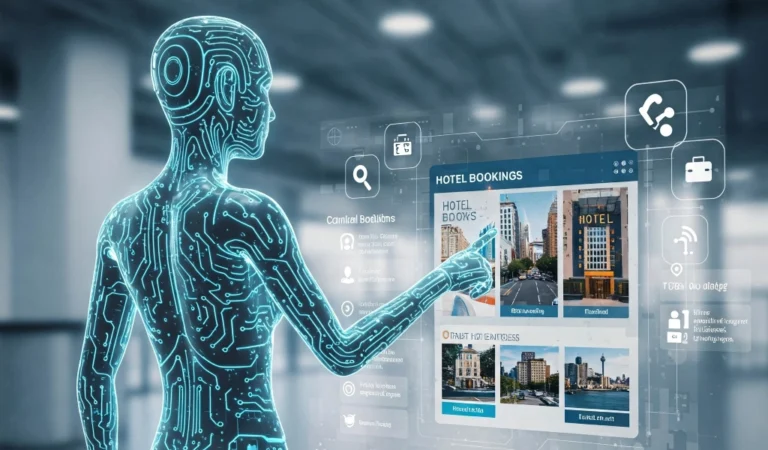In today’s digital-first travel world, consumers are overwhelmed with options. From comparing prices across multiple booking sites to reading through hundreds of reviews, booking a hotel can be more stressful than the vacation itself. But a new wave of technology is simplifying the experience. AI agents like OpenAI’s Operator are fundamentally transforming how we search, select, and book accommodations—offering a smarter, more personalized, and hands-free experience.
If you’ve ever wished that booking a hotel could be as easy as saying, “Find me a quiet, pet-friendly hotel in the mountains for under $200,” and having someone handle the rest—your wish is now reality.
In this article, we’ll explore how AI agents are revolutionizing hotel bookings, what makes OpenAI’s Operator different from traditional booking tools, and what this evolution means for both travelers and the hotel industry.
What Are AI Agents Like OpenAI’s Operator?
AI agents are autonomous digital assistants powered by artificial intelligence. Unlike traditional chatbots or virtual assistants that rely on scripted responses, AI agents understand human language, interpret user intent, gather information from various sources, and perform multi-step tasks independently.
OpenAI’s Operator is one of the most advanced examples. It’s designed to interact with websites and apps like a human would—but faster, smarter, and more consistently. It can complete tasks such as finding hotels, comparing rates, checking reviews, and even booking your stay—all based on a simple, conversational request.
The Problem With Traditional Hotel Booking Platforms
Let’s face it: hotel booking today can be a nightmare.
Even the most popular platforms like Booking.com, Expedia, and Airbnb still rely heavily on manual filtering and comparison. Users must toggle between tabs, decipher inconsistent review scores, interpret hidden fees, and often settle for something “good enough” rather than ideal.
This model has several flaws:
- Information overload: Too many options with too little context.
- Limited personalization: Filters don’t capture your unique needs.
- Time-consuming: Researching takes hours.
- Lack of human-like understanding: Systems don’t “get” what you really want.
This is where AI agents come in.
How AI Agents Are Revolutionizing Hotel Bookings
1. Truly Personalized Recommendations
AI agents don’t just apply filters—they understand nuance.
For example, if you say:
“Find me a hotel with a rooftop bar, walkable to downtown Nashville, but not on a noisy street. Budget around $180 a night.”
A traditional platform might struggle to match all those conditions. But an AI agent like Operator interprets this naturally, searches across different platforms, reads reviews for context (like noise complaints), and delivers handpicked options that actually match your intent, not just your filters.
2. Automation of Tedious Tasks
Rather than bouncing between tabs, AI agents do all the legwork:
- Comparing rates across sites (Booking, Agoda, Google Hotels, etc.)
- Reading and analyzing reviews from TripAdvisor or Yelp
- Checking room availability in real time
- Understanding cancellation policies
- Even applying loyalty programs if linked
AI agents act like an elite personal travel assistant—saving you time and frustration.
3. Conversational Booking Process
Gone are the days of drop-down menus and confusing user interfaces. With AI agents, you simply talk or type naturally:
“I’m heading to New York next weekend. Can you find me a quiet hotel in Manhattan close to Central Park, preferably under $250 a night?”
That’s it. The agent understands and responds just like a human travel agent would—but instantly.
4. Proactive Travel Adjustments
Flight delay? Change in plans? AI agents can automatically:
- Reschedule hotel bookings
- Notify the property
- Find alternatives nearby
- Help you avoid cancellation fees
This level of real-time adaptability was never possible with static travel platforms.
Behind the Scenes: How It All Works
The power of OpenAI’s Operator and similar AI tools lies in their technological stack:
- Natural Language Processing (NLP): Helps the agent understand your request the way a human would.
- Machine Learning Algorithms: Enables the agent to learn from previous choices, improving results over time.
- Web Browsing Capabilities: Lets the AI search the web, analyze data, and act just like a person using a computer.
- APIs and Integrations: Allows seamless connection with hotel databases, review sites, maps, calendars, and more.
This isn’t just about searching—it’s about thinking, comparing, choosing, and acting, all in real time.
Benefits of AI-Powered Hotel Booking for Travelers
✅ Time Efficiency
AI agents eliminate hours of searching, comparing, and second-guessing. What used to take hours now takes minutes or seconds.
✅ Better Travel Decisions
By analyzing reviews, amenities, and contextual information, AI agents help you avoid costly mistakes—like booking a hotel that’s under construction or in a sketchy neighborhood.
✅ Stress-Free Changes
Whether your trip is extended, delayed, or canceled, AI agents can handle rescheduling, rebooking, and communicating with hotels for you.
✅ Personalized Experiences
Frequent traveler? Luxury seeker? Budget backpacker? AI agents learn your preferences over time and get better at recommending exactly what you like.
What This Means for Hotels and the Hospitality Industry
The rise of AI booking agents isn’t just a win for travelers—it’s a wake-up call for the hotel industry.
🔹 Hotels Must Be AI-Friendly
If your hotel’s website doesn’t have structured data, fast load times, or easy-to-read descriptions, AI agents might overlook it. Just like SEO for Google, AI-optimized listings will become essential.
🔹 Direct Bookings May Increase
AI agents can be programmed to favor direct bookings if prices and benefits are the same or better—cutting out middlemen and improving hotel profit margins.
🔹 Smart Customer Service
In the future, AI agents could help hotels manage customer requests, provide instant upgrades, or anticipate guest needs based on AI-collected preferences—boosting satisfaction and loyalty.
Use Cases Already in Action
Here’s how AI agents like Operator are being used today:
- Business travelers request specific hotel amenities like fast Wi-Fi, quiet floors, and early check-in—all handled automatically.
- Solo travelers get suggestions for safe, well-reviewed properties in unfamiliar cities.
- Eco-conscious travelers can ask for sustainable hotel options without having to research each property manually.
These aren’t futuristic scenarios—they’re happening now.
Challenges and Limitations
No technology is without hurdles. Here are some current challenges:
- Privacy concerns: AI agents may require access to personal data like travel plans, location, and payment methods.
- Bias in algorithms: If data sources are biased, recommendations may reflect that.
- Lack of human judgment: AI can’t always replace the local knowledge or personal touch of a human travel advisor—yet.
Still, as these tools evolve, trust and transparency will become top priorities for developers and users alike.
The Future of AI in Hotel Booking
Looking ahead, AI booking agents will become even more capable:
- Integrated Itinerary Management: From hotel stays to restaurant bookings, AI will plan entire trips.
- Voice-First Experiences: Think Siri or Alexa, but with full booking capabilities.
- Multi-Agent Collaboration: AI agents may communicate with hotel bots, airline systems, and rental platforms—creating a seamless travel experience.
In essence, AI will evolve from a booking tool into a 24/7 digital travel concierge.
Final Thoughts
AI agents like OpenAI’s Operator are reshaping the hotel booking experience from the ground up. No more tab overload. No more mediocre stays. No more decision fatigue.
This is the beginning of a new era where hotel bookings are smart, seamless, and tailored to you—powered by AI that thinks like a human, but acts with the precision of a machine.
As these tools continue to advance, one thing is clear: The future of travel is not just digital—it’s intelligent.



1 Comment
Pingback: The Coming ‘Skills Crash’: 10 Professions That Will Be Worthless by 2026